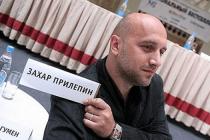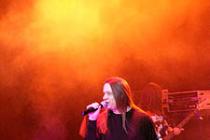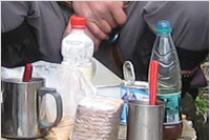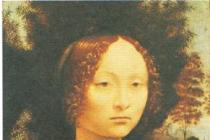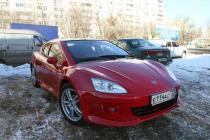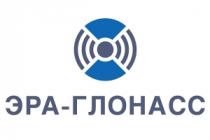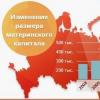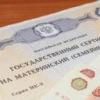Name: Zakhar Prilepin.
Place of Birth: Ilyinka village, Skopinsky district, Ryazan region.
Parents: Prilepin Nikolai Semenovich, history teacher.
Nisiforova Tatyana Nikolaevna, physician.
Place of residence: Russia, Nizhny Novgorod.
Education: Nizhny Novgorod State University named after N.I. Lobachevsky, Faculty of Philology.
School of Public Policy.
Publications: published since 2003
Prose: “Friendship of Peoples”, “Continent”, “New World”, “The Art of Cinema”, “Roman-Newspaper”, “North”.
Writer, actor, musician. Chief editor of the Free Press website. Secretary of the Writers' Union of Russia. Presenter of the author’s program “Russian Lessons” on the NTV channel. Deputy artistic director of the Moscow Art Theater. M. Gorky.
The Zakhar Prilepin Foundation provides humanitarian assistance to the residents of Donbass.
Books:
1. “Pathologies”, novel (2005)
2. “Sankya”, novel (2006)
3. “Sin”, one life in several stories (2007)
4. “Boots full of hot vodka: boys' stories” (2008)
5. “I came from Russia,” essay (2008)
6. “This concerns me personally,” essay (2009)
7. “Leonid Leonov: His game was enormous,” study (2010)
8. “Black Monkey”, story (2011)
9. “Eight”, short stories (2011)
10. “The Book Reader,” a guide to the latest literature (2012)
11. “The Abode”, novel (2014)
12. “Flying Barge Haulers,” essay (2014)
13. “Not someone else’s troubles,” essay (2015)
14. “Dissimilar poets: Mariengof, Lugovskoy, Kornilov”, research (2015)
15. “Seven Lives”, collection of short prose (2016)
16. “Everything that must be resolved...: Chronicle of the ongoing War”, non-fiction (2016)
17. “Platoon.” Officers and militias of Russian literature" (2017)
18.
“Life and stanzas of Anatoly Mariengof” (2018)
19. “Some won’t go to hell,” phantasmagoria novel (2019)
Compiler of anthologies and collections:
1. “War. WAR" (2008, "ASTREL")
2. “Revolution. Revolution" (2009, "ASTrel")
3. “Name day of the heart. Conversations with Russian Literature" (2009, "ASTrel")
4. “Lit Perron. Anthology of Nizhny Novgorod poetry" (2011, "Books")
5. “Ten. Anthology of prose of the “zero” years” (2011, “Ad Marginem”)
6. “Lemonka to prison.” (2012, “Tsentrpoligraf”)
7. "14. Anthology of women's prose of the “zero” years" (2012, "ASTrel")
8. Leonid Leonov. Collected works in six volumes (2013, “Terra”)
9. Anatoly Mariengof. Collected works in three volumes (2013, “Terra”)
10. Poets of the 20th century: Vasiliev, Yesenin, Kornilov, Lugovskoy, Mariengof. Anthology in five books (2015, “Young Guard”)
11. “Limonka to war” (2016, Algorithm)
12. “I am the wounded earth” (2017, “Terra”)
Filmography:
1. “Eva” (KMF, 2019) - Ukrainian oligarch, Eva’s father.
2. “Duty” (KIFF, war drama, 2017) - militiaman Cat.
3. “Guyler” (film, 2017) - Dima.
4. “THREAT: Trepalov and Wallet” (TV series, 2016) - poet Vladimir Lugovskoy.
5. “Eight” (film, 2013) - taxi driver.
6. “Inspector Cooper” (TV series, 2012) - Sergei Vasiliev, killer.
Screen adaptations:
- "White square"(director - Ivan Pavlyuchkov), 2012. Screen adaptation of the story “White Square”. In 2012, the film received the Bronze Frame prize at the 12th International Short Film Festival “Unseen Cinema” in Maardu (Estonia) and the Grand Prix at the International Film Festival “Metra” (Russia).
- "Eight"(director - Alexey Uchitel), 2013. Screen adaptation of the story “Eight”.
- "Fucking story"(director Mara Tamkovich, Poland) 2015. Short film based on the story by Zakhar Prilepin “Fucking Tale.”
- "Dog meat"(directed by VGIK graduate Ksenia Tishchenko), 2017. Short film based on the story of the same name by Zakhar Prilepin.
Discography:
- Zakhar Prilepin and the Elefank group - “Seasons” (2011)
- Zakhar Prilepin and the Elefank group - “Coup” (2013)
- Rich and Zakhar Prilepin - “Pathologies” (2013)
- Zakhar Prilepin and the Elefank group - “Hunter” (2015)
- Rich and Zakhar Prilepin - “On the Ocean” (2016)
- Zakhar Prilepin and the Elefank group - “Multi-Colored” (2017)
Awards:
Prize finalist:
- 2005: “National bestseller” (novel “Pathologies”)
- 2005: “Boris Sokoloff Prize” (novel “Pathologies”)
- 2006: “Russian Booker” (novel “Sankya”)
- 2006: “National bestseller” (novel “Sankya”)
- 2006: Diploma of the Eureka Award (novel Sankya)
- 2007: im. Y. Kazakova - for the best story of the year (story “Sin”)
- 2009: im. I. A. Bunin - for the book of journalism “Terra Tartarara: This concerns me personally”
- 2012: “Big Book” (novel “Black Monkey”)
- 2014: “Russian Booker” (novel “Abode”)
Award winner:
- 2005: BRF “Inspire Paris” award
- 2006: Roman Newspapers Award in the Discovery category
- 2007: All-China Literary Award "Best Foreign Novel of the Year" - the novel "Sankya"
- 2007: “Exclusive of the Year” award from the Nazlobu.ru website for political journalism
- 2007: Yasnaya Polyana Prize “For an outstanding work of modern literature” (novel “Sankya”)
- 2007: “True Sons of Russia” award (for the novel “Sin”)
- 2008: “Soldier of the Empire” award - for prose and journalism
- 2008: National Bestseller Award (novel “Sin”)
- 2008: Award “Bestseller OZON.RU” - based on sales results in the OZON.RU online store
- 2009: “Art Person” of the Year according to the radio station “Europe Plus”
- 2010 National Award “Best Books and Publishing Houses 2010” in the “Biographies” section - for the book “Leonid Leonov: His Game was Enormous”
- 2011: “Supernational Best” award ($100,000 for the best prose of the decade)
- 2011: GQ Magazine Writer of the Year
- 2012: “The Bronze Snail” (2012) in the “Large Form” nomination for the best science fiction novel of the year - “Black Monkey”.
- 2012: Man of the City (Nizhny Novgorod).
- 2012: BookMix.ru award in the “Experts’ Choice” category (novel “The Black Monkey”)
- 2014: Book of the Year Award for the novel “The Abode” (Annual National Competition)
- 2014: “Runet Book Prize 2014” in the category “Best Fiction Book” (novel “Abode”)
- 2014: “Big Book” award (novel “The Abode”)
- 2014: Nizhny Novgorod regional award “Awakening” in the category “Leader of the Year”
- 2014: “Alexander Ivanovich Herzen Prize” (for the book “Peresvet is coming to us”)
- 2015: “Vadim Valeryanovich Kozhinov Award” (for “Notes from Novorossiya”, social and literary activity)
- 2015: Zakhar Prilepin became a laureate of the Yesenin Prize
- 2015: Zakhar Prilepin’s novel “The Abode” became the winner of the IV competition “Inspector General - 2015” in the “Buyer’s Choice” category. Publisher of the best-selling book in paper version"
- 2017: Ivo Andric Prize (Serbia) for the books “The Abode” and “Seven Lives”
- 2017: Russian Government Prize for achievements in the field of culture
- 2017: awarded the Donbass Volunteer Cross
- 2017: awarded the highest award of the International Slavic Literary Forum “Golden Knight” (Irkutsk) - the gold medal named after. A.S. Pushkin
- 2017: became a laureate of the Alexander Nevsky Prize. The writer was awarded the first prize for the book “Platoon. Officers and militias of Russian literature".
- 2018: award “For preserving the traditions of the Russian literary school, educational and social activities.”
- 2018: The military drama “Duty” (KMF) received the main prize for Best Narrative Short at the Tribeca festival in New York and became a contender for an Oscar. Directed by Lenar Kamalov, starring Zakhar Prilepin.
- 2018: Winner of the international prize of the city of Cassino “Letterature dal fronte” for the novel “Pathologies” (Italy).
- 2018: Laureate of the Lermontov Prize in the category “For achievements in literary creativity that has received public recognition” for the books “Dissimilar Poets” and “Platoon”.
- 2018: Winner of the international award “Person of the Year - 2018”. Humanitarian activities. Donbass.
The French edition of Zakhar Prilepin’s book “Pathologies” received the prestigious “Russophonia” award in France for the best translation of a Russian book.
The film “White Square” (directed by Ivan Pavlyuchkov) received the “Bronze Frame” prize at the 12th international short film festival “Unseen Cinema” in Maardu (Estonia) and the Grand Prix at the “Metra” international film festival (Russia).
Zakhar Prilepin's works have already been translated into 23 languages: English, Arabic, Armenian, Bulgarian, Hungarian, Vietnamese, Greek, Danish, Italian, Spanish, Chinese, Latvian, Moldavian, German, Norwegian, Polish, Romanian, Serbian, Slovenian, Finnish, French , Czech, Japanese.
Books by Zakhar Prilepina are included in the curriculum of Russian universities in the humanities. The textbook “History of Russian Literature of the 20th Century”, published in 2013 (recommended by the Ministry of Education and Science, is the first textbook that fully complies with the Federal State Standard), introduced a separate chapter on Zakhar Prilepin, completing the course of modern literature.
Activity: journalist (formerly: handyman, security guard, loader, riot police squad commander, etc.)
Family status: happily married.
Achievements: four children.
Beliefs: National Bolshevik, member of the “Other Russia” party (chairman E. Limonov).
Passions:
Prose:
Gaito Gazdanov: “Evening at Claire’s”, “Night Roads”, “The Ghost of Alexander Wolf”
Romain Gary: "Promise at Dawn"
Boris Zaitsev: “Golden Pattern”
Thomas Mann: Joseph and His Brothers
Henry Miller: "Sexus"
Anatoly Mariengof: “Cynics”
Vladimir Nabokov: “Hell or the Joy of Passion”
Leonid Leonov: “Pyramid”, “Thief”, “Road to the Ocean”, “Evgenia Ivanovna”
Eduard Limonov: “It’s me, Eddie”, “Diary of a Loser”
Alexander Prokhanov: “Palace”, “Third Toast”
Mikhail Tarkovsky: “Frozen Time”
Alexander Terekhov: “Stone Bridge”, “Babaev”
Jonathan Franzen: "Corrections"
Mikhail Sholokhov: “Quiet Don”
Russian classics of the 19th century, PSS.
Poetry:
Cesar Vallejo, Pavel Vasiliev, Sergei Yesenin, Eduard Limonov, Boris Ryzhiy.
Russian Silver Age. Greek poetry of the 20th century. Latin American poetry of the 20th century.
Tunes:
Marc Almond - "Enchanted", "Open All Night"
Cure - "Kiss Me, Kiss Me, Kiss Me", "Disintegration"
Manu Chao - “Proxima Estacion. Esperanza"
50 cent – “Get Rich Or Die Try”
Aquarium - “Radio Africa”, “Russian Album”
Alexander Bashlachev - “Eternal Lent”
Alexander Dolsky - “The State of Blue Eyes”, “Portrait in a Frame”
"Machine Band" - "Bomb"
And:
- A-ha, Nick Cave, Depeche Mode, Rob Dougan, Marley and sons, Sinead O'Connor.
- “25/17”, “AuktYon”, Mikhail Shcherbakov, Elena Frolova.
Movie:
"Angel's Heart", dir. Alan Parker
“Among the Gray Stones”, dir. Kira Muratova
Favorite Quote:
“Am I my brother’s keeper?” (Cain).
“They said that I insulted the Queen of Prussia, not at all. I just told her: “Woman, go back to your spinning wheel and household.” I have nothing to reproach myself with. I ordered the release of her favorite Hatzfeld, otherwise he would have been shot” (Napoleon).
“If you die, you will know everything; or you’ll stop asking” (Leo Tolstoy).
Prepared from interviews and publications of Zakhar Prilepin.
Evgeny Nikolaevich Prilepin, better known under the pseudonyms Zakhar Prilepin and Evgeny Lavlinsky, was born on July 7, 1975 in the village of Ilyinka, Skopinsky district, Ryazan region. His mother was a nurse in a rural hospital, and his father was a history teacher.
Prilepin spent his childhood in Skopin, and in the mid-80s (according to Prilepin himself, “somewhere in 1986”) his family moved to Dzerzhinsk, Nizhny Novgorod region, where his parents got an apartment and quickly found work (his mother began working at the chemical plant "Korund"). At the age of 16, Prilepin himself began working - he got a job as a loader in a bread store. When the young man was 17 years old and still studying at school No. 10 in the city of Dzerzhinsk, his father died.
In 1994, Prilepin was drafted into the army. Details of his military service were not found (editor's note) - except for the mention that, according to some sources, the future writer was “commissioned for unclear reasons.”
It is known that Prilepin studied at the Police School (in what years was not specified). In 1996, he began serving in the Special Purpose Police Unit (OMON). As a commander of an OMON squad in 1996 and 1999, he took part in armed actions on the territory of Chechnya and spent a total of six months there. Meanwhile, information about Prilepin as a riot policeman and the possibility of him receiving the post of squad commander caused distrust among some observers who analyzed the writer’s texts about the Chechen campaign.
In parallel with his service in the riot police, Prilepin studied at the evening department of the philological faculty of the Nizhny Novgorod State University. N.I. Lobachevsky and lived “in two cities.” According to some sources, he graduated from the university in 1999.
After the 1998 default, Prilepin, in his own words, began to not have enough riot police salary to support his family, and sometimes he was forced to work as a bouncer in nightclubs. He also did not hide the fact that in the last year of work in the riot police, “he took shifts on the Moscow highway, stopped all the trucks from the Caucasus and took away their watermelons, oranges, bananas, because there was only potatoes at home.”
In 1999 (according to other sources - in 2000; it was also mentioned that 6 years after the start of work) Prilepin left the riot police and in 2000, together with his wife and son Gleb, he moved to Nizhny Novgorod, where he began writing for one of the Nizhny Novgorod newspapers and quickly made a career. In particular, he worked at the Political News Agency - Nizhny Novgorod. As a journalist, Prilepin used different pseudonyms, the most famous of which is Evgeniy Lavlinsky (sometimes the media noted that Lavlinsky was his real name). Prilepin began to study literature later. His first publications - poetry - date back to 2003. In the same 2003, Prilepin wrote the novel “Pathologies” about the “second Chechen” war and began to look for an opportunity to publish it. The novel was first published in magazines, and in 2005 it was published as a separate book by the St. Andrew's Flag publishing house.
Since 2006, various Russian publishing houses have published Prilepin's books "Sankya" (2006), "Sin" (2007), "Boots Full of Hot Vodka: Boys' Stories" (2008), "I Came from Russia" (2008), " Terra Tartarara: This concerns me personally" (2008), "Name Day of the Heart: Conversations with Russian Literature" (2009) and others. By the summer of 2011, Prilepin had published 9 novels and compiled 4 anthologies. In addition, he wrote a biography of the writer Leonid Leonov for the series “The Lives of Remarkable People.” Prilepin became the winner of numerous awards, including “True Sons of Russia” (2007, for the novel “Sin”), “Soldier of the Empire” (2008, for prose and journalism), “National Bestseller” (2008, for the novel “ Sin") and the All-China Award for "Best Foreign Novel" (2007, for the novel "Sankya"). In 2009, Prilepin became secretary of the Russian Writers' Union.
Best of the day
Prilepin did not give up his journalistic activities. As of 2011, he was a columnist for the magazines Ogonyok, Russian Life and Bear, and was also the editor-in-chief of the Nizhny Novgorod branch of Novaya Gazeta. In addition, Prilepin was a member of the editorial board of the magazine "Friendship of Peoples". Prilepin's journalism appeared in other publications, including Sex in the City and Glamor magazines.
Prilepin's works also became the object of critical criticism. Thus, in October 2008, the president of Alfa Bank, Petr Aven, wrote a negative review of the novel “Sankya” for the magazine “Russian Pioneer”, in which he indicated that Prilepin’s heroes are engaged in revolutionary activities out of idleness and unwillingness to work. Aven’s article gave rise to a heated debate in the press, to which a separate section was devoted on Prilepin’s official website. Aven was not the only critic of Prilepin. The writer Alexander Bushkovsky, who himself served in the Special Rapid Reaction Detachment - SOBR, in the article "Rereading "Pathologies". Absurdities and oddities in stories about the war", published in "Questions of Literature" in 2011, noted that the novel is not distinguished by its plausibility in that , regarding the details of combat operations. The terminology used by the author also caused distrust among the critic.
The media wrote about Prilepin’s left-radical views. In 1996, he met the head of the unregistered National Bolshevik Party, Eduard Limonov, and in 1997 he joined the NBP. In June 2005, the NBP was liquidated as a public organization and excluded from the unified state register of legal entities, and in March 2007, the Moscow prosecutor's office additionally announced the suspension of the activities of the NBP for violating the law "On Combating Extremist Activities" by the Limonovites. However, in an interview with the French publication Liberation in 2009, Prilepin talked about himself as a nationalist leader. He especially emphasized that the leader of his party is a “prophet of freedom” who is not a supporter of violence and “has never shed a drop of blood.” In addition, the writer mentioned Limonov among his most revered writers, noting that his influence on literature “is comparable to the influence that Dostoevsky and Tolstoy had in their time.”
It is known that Prilepin studied at one of the Schools of Public Policy created in various regions of Russia by the Open Russia charitable foundation, founded by the head of the Yukos oil company Mikhail Khodorkovsky. It was not specified which School and in what years the writer studied (it is known that the Nizhny Novgorod Regional School of Public Policy was opened in the spring of 2005).
Prilepin was also mentioned as a member of the “Other Russia” coalition. In 2007, the writer became one of the organizers of the Nizhny Novgorod March of Dissent. In the same year, he, together with Alexei Navalny and Sergei Gulyaev, founded the all-Russian public organization "People", which proclaimed as its ideology "democratic nationalism" - the fight for democracy and the rights of Russians (according to some sources, the organization ceased to exist in 2008. By July In 2010, the "Other Russia" coalition also ceased to exist. On its basis, on the initiative of Limonov, a party of the same name was created, which, however, could not be registered. Limonov, who became a member of this party, later called himself one of its most active figures in Nizhny Novgorod In 2011, in one of his interviews, Prilepin spoke about his inner need to participate in political life and that in Russia “a person who is a father of many children ... cannot be a member of United Russia, but must be physically present in the political space."
The writer met with Vladimir Putin several times in Novoogarevo when he was president of Russia. The conversation during the meeting of the head of state with writers was not only about literature, but also about politics. To the pointed questions asked by Prilepin about Russia’s relations with Georgia and Belarus, about Chechnya, about the situation of state employees and pensioners in Russia, Putin, in the words of the writer himself, answered “convincingly, but deeply meaningless.”
In May 2011, Prilepin became the laureate of the Supernational Best award for the best prose of the decade, beating out other contenders for this award - writer Viktor Pelevin and poet Dmitry Bykov. According to Prilepin, he gave part of the money received for “Supernatsbest” to political prisoners of the National Bolsheviks, “helped several families,” and planned to spend the rest on his family. In the same month, director Kirill Serebrennikov staged the play “Thugs” based on Prilepin’s novel “Sankya”. The writer spoke of this production, which he attended four times, as “incomparably good.” In September 2011, Prilepin received an award from GQ men's magazine in the "Writer of the Year" category.
The writer said that he liked all active and “wild” people who are not “state patriots”; in particular, he mentioned the members of the art group “War”. As for musical preferences, Prilepin separately noted his passion for Russian rock and the work of Boris Grebenshchikov. It was reported that Prilepin himself writes music. In his youth, he played in the rock band "Innonia", and in June 2011 he released an album recorded with the group "Elefunk" (also appeared in the press as "Elefank".
Prilepin repeatedly mentioned that writing for him is a way to feed his family. The writer is married (his wife also studied at the philology department of UNN), the couple has four children: Gleb, Ignat, Kira and Lilia, born on August 1, 2011. It was noted that Prilepin is an Orthodox Christian, regularly attends church, and all his children are baptized. As of 2011, the writer lived in Nizhny Novgorod. It was reported that he has a house in the forest on the banks of the Kerzhenets River, where he likes to spend time with his family, St. Bernard Shmel and cat Bina.
Prilepin has a sister, Lena, who lives with their mother in Dzerzhinsk. It was mentioned in the media that Prilepin’s relative is Vladislav Surkov, First Deputy Head of the Russian Presidential Administration. In addition, it was reported that Surkov and Prilepin grew up in the same city. The writer himself clarified that he and Surkov “are not blood relatives, and have long been no longer related at all” - Prilepin’s sister was previously married to Surkov’s cousin.
Family
Parents: teacher and nurse.
Married. Has four children. The media has repeatedly mentioned Prilepin's relationship with the now Deputy Prime Minister. In addition, it was reported that Surkov and Prilepin grew up in the same city. The writer himself clarified that " he and Surkov are not blood relatives, and have long been no longer related at all"Prilepin's sister was previously married to Surkov's cousin.
Biography
Evgeny Prilepin was born on July 7, 1975 in the village of Ilyinka, Skopinsky district, Ryazan region.
He started working at the age of 16. His first place of work was a bakery store, where he worked as a loader.
Graduated from the Faculty of Philology of Nizhny Novgorod State University. N.I. Lobachevsky and the School of Public Policy.
He worked as a laborer, a security guard, and served as a squad commander in the riot police, so over the years he has been on both sides of the barricades: in his youth, he dispersed demonstrations as part of a riot police detachment, and later he himself participated in them.
He took part in hostilities in Chechnya in 1996 and 1999.
In 1999, he left his service in the riot police and got a job as a journalist for the Nizhny Novgorod newspaper "Delo". Published under many pseudonyms, the most famous of which is “Evgeniy Lavlinsky”. In 2000, he became editor-in-chief of the newspaper. At the same time, he begins work on his first novel, Pathologies.
The newspaper, as he admitted, " it was yellow, scary, in some places even Black Hundred, although it was part of Sergei Kiriyenko’s holding. And I realized that I was wasting my life on nothing, and I began to write a novel. At first it was a novel about love, but gradually (I worked for three or four years) it turned into a novel about Chechnya as about my most powerful life experience".
Prilepin's works were published in various newspapers, including Literaturnaya Gazeta, Limonka, On the Edge, General Line, as well as in the magazines Sever, Druzhba Narodov, Roman-Gazeta, " New World", "Snob", "Russian Pioneer", "Russian Life".
He was the editor-in-chief of the National Bolshevik newspaper of Nizhny Novgorod "People's Observer".
Participated in the seminar of young writers Moscow - Peredelkino (February 2004) and in the IV, V, VI Forums of young writers of Russia in Moscow.
During these years, the writer became a laureate of the Boris Sokolov Prize, the Eureka Prize, and the All-China International Literary Prize. His novels are among the nominees for the main prize of such literary awards as Russian Booker and National Bestseller. In 2011, with the novel “Sin,” Zakhar became the winner of the “Super National Best” award, and also received the long-awaited “National Bestseller” award.
In October 2008, the billionaire president of Alfa Bank wrote a negative review of the novel Sankya for the Russian Pioneer magazine, which caused a heated public debate. In his review, he literally trashed the novel, and accused Prilepin and his party comrades of calling the people to revolution, rebellion, without understanding what consequences this could cause. " We don't need a revolution, we've already been through this, says Aven, Our problem is not that the authorities are bad, but that the Russian people are lazy"Aven called Prilepin and his heroes losers, losers who can't do anything, aren't capable of doing things, and therefore go into politics and the barricades." And me and my colleagues, - Aven further says, - we earned our capital through honest work and we have nothing to ask forgiveness from the people for".
Since July 2009, he has been the host of the program “No Country for Old Men” on the PostTV channel. Member of the Civil Literary Forum of Russia.
In 2011, Zakhar Prilepin, as a rap artist, recorded a joint track with musicians from the group “25/17” for the album of their side project “Ice 9” - “Cold War”. The track is called "Kittens". A video was shot for it, in which Zakhar Prilepin played the main role. Later, in March 2013, Zakhar starred in the video “Axes” by the same group.
In 2011, Zakhar Prilepin formed his own group “Elefank”. The group released their debut album, “Seasons,” on the “Noon Music” label.
In 2012, Zakhar Prilepin acted as an actor, playing in the TV series “Inspector Cooper.”
In 2013, he appeared in a small role in the film adaptation of his story “Eight”. Film director Alexey Uchitel comments on the writer's participation in the film: " Zakhar Prilepin, on my initiative, starred as an actor in a very small role of a taxi driver and showed amazing comedic talent".
In February 2017, Zakhar Prilepin received the position of deputy commander of a special forces battalion for working with personnel of the DPR army.
Prilepin announced his transfer to serve in the army of the unrecognized republic in an interview with Komsomolskaya Pravda.
“I’m an officer. Naturally, I’ll have to shoot. Here I don’t feel like a writer. There is some complexity here. I won’t even hide it. After all, I was directly involved in the management of units, scary to say, 20 years ago.”, - said Prilepin.
As the writer said, there are no fewer people wanting to join the DPR army, both among local residents and from Russia.
Scandals
On July 30, 2012, the “Letter to Comrade Stalin” by Zakhar Prilepin was published on the Free Press website. The article caused a huge resonance in the intellectual community, splitting it into two camps. The “letter” is written on behalf of the liberal intelligentsia, hidden under the impersonal pronoun “we”. The article is based on contrasting “you” with those who hate “him”.
As the quote suggests, "you" can refer to Stalin as a symbol of the USSR and the Soviet people during his life: " Both “Western democracies” and “Western autocracies”, and these same financial circles hated you, and they still hate you, because they remember with whom they once dealt. They were dealing with something in all respects opposite to us. You are a different starting point. You are the other pole. You are the bearer of a program that our small-town consciousness will never accommodate.". Among those who hate are the rulers of his time. (" They hate those who do. There are no complaints against those who do nothing. What did the heads of France, or Norway, or, say, Poland do when that war began, recall?") and ours (" if you lived another half century, no one would trade the great space odyssey for iPads and computer games").
He believes that the pronoun “we” is a euphemism that replaces not “the Russian liberal public”, but the word “Jews”, and since the article is against “we”, it is anti-Semitic.
Vladimir Bondarenko, summing up the literary results of the year, he singled out “Letter to Comrade Stalin”: “ I consider the second equally noisy and equally literary significant event of 2012 to be Zakhar Prilepin’s artistic essay-pamphlet “Letter to Comrade Stalin”. He compared the attacks on the author with similar attacks on Lermontov and came to the conclusion: " Stalin is more of a background here for both Zakhar and his opponents. The debate is not about him. Zakhar dug deeply into the traditional confrontation between the people and the court elite in Russia. If this letter shook all of Russia, it means that the writer’s word still has weight. Russian literature will not disappear either".
Zakhar Prilepin- Russian writer, author of the cult novels “ Sankya", philologist, journalist, politician, businessman, actor, member of the musical group " Elefunk».
Childhood and youth of Zahar Prilepin / Zahar Prilepin
Zakhar Prilepin(real name - Evgeniy Nikolaevich Prilepin) grew up in a large village family of a teacher and a health worker. It was during Prilepin’s childhood that the patriarchal foundation was laid, which helps the father of many children maintain a special atmosphere in the house, unusual for a modern Russian. The future writer was forced to begin working at the age of sixteen as a laborer and security guard, combining with his studies at Nizhny Novgorod State University named after. N. I. Lobachevsky and in School of Public Policy. After graduating from higher education institution Zakhar Prilepin went to serve as a squad commander in the riot police, and also participated in combat operations in Chechnya in 1996 and 1999.
The creative path of Zakhar Prilepin / Zahar Prilepin
In 1999 Zakhar Prilepin decides to end his career in public service and gets a job at the Nizhny Novgorod newspaper “ Case». Zakhar Prilepin tries himself in the journalistic field, his journalistic materials are published under various pseudonyms, including “Evgeniy Lavlinsky”. In 2000, Prilepin was promoted to the status of editor-in-chief of the newspaper. At the same time, the successful journalist begins to work on his first novel, “ Pathologies».
I realized that I was wasting my life on nothing, and began to write a novel. At first it was a novel about love, but gradually (I worked for three or four years) it turned into a novel about Chechnya as about my most powerful life experience - as they say, no matter what you do, a Kalashnikov appears.
Zakhar Prilepin published in various newspapers and magazines, including "Literary newspaper", right-wing radical “Limonka”, “On the Edge”, “General Line”, “North”, “Friendship of Peoples”, “Roman Newspaper”, “New World”, “Snob”, “Russian Pioneer”, “Russian Life”. Due to his political convictions, he worked as editor-in-chief of the newspaper of the National Bolshevik Party branch in Nizhny Novgorod " People's Observer ». Zakhar Prilepin attended various forums organized to support aspiring Russian writers.
In 2009 Zakhar Prilepin tries himself as a TV program host " No Country for Old Men" on the channel " PostTV" In 2011 Zakhar Prilepin decided to engage in musical activities and formed a group " Elefank", who recorded and released the first album " Seasons" In 2012 Zakhar Prilepin participates in the filming of the series " Inspector Cooper"and the film by Alexei Uchitel "Eight", the writer performs short cameo roles.
Zakhar Prilepin, on my initiative, starred as an actor in a very small role of a taxi driver and showed amazing comedic talent. “I was amazed,” admits director Alexey Uchitel.
In 2012 Zakhar Prilepin approved for the position of chief editor of the site " Free press", as well as articles by a writer-journalist are published in publications “Story”, “Ogonyok”, “Novaya Gazeta”.
In 2012, director Kirill Serebrennikov staged the play “ Scumbags» based on the cult novel Zakhara Prilepina « Sankya" The play was nominated for a theater award " Golden Mask" and took the main prize.
In 2011, Zakhar Prilepin became the winner of the Super National Best award; the novel “Sin” was named the best book of the decade.
Politics in the life of Zahar Prilepin / Zahar Prilepin
Zakhar Prilepin openly stated that in the early 2000s he shared the views of the National Bolshevik Party (“NBP”), which was subsequently banned at the state level, and was a supporter of the coalition “ Another Russia", took part in organizing the Nizhny Novgorod March of Dissent in 2007.
In 2007 Zakhar Prilepin is one of the co-founders of the national democratic movement " People", the chairmen of the movement were chosen Sergey Gulyaev, Alexey Navalny And Zakhar Prilepin. In 2010, the writer signed the appeal of the Russian opposition “Putin must leave.”
Putin is a system, and the entire system needs to be changed. An open political space is needed. First of all, the country must be brought out of the state of political freeze. This requires a free parliament, debate, and an independent press.
Personal life of Zakhar Prilepin / Zahar Prilepin
Zakhar Prilepin lives happily legally married to his wife Maria Prilepina. The marriage produced four children - Gleb, Ignat, Kira, Lilya. Maria and Evgeniy Prilepin We met in our third year at the Faculty of Philology, the relationship began quickly and proceeded rapidly, and a few years later our first child was born. Evgeniy Prilepin was often absent from home, wandering around hot spots, Maria, with a child in her arms, always looked through the news from the “hot spots.”
In our country, the birth of children was always preceded by a terrible period - lack of money, illness of relatives. But as soon as I gave birth, everyone recovered, and a stable period began,” says Maria Prilepina.
Zakhar Prilepin I am convinced that the secret of family happiness is two points: not to sort things out and always share the blame in half. In addition, the constant employment of her husband and the number of children in the house force Maria and Evgeniy to constantly miss each other. Writer Zakhar Prilepin he tries to spend six months in the Nizhny Novgorod region, limiting himself in communication with the outside world, and the other six months he makes work trips and attends business meetings, festivals, and television programs.
I watch how my daughter sleeps, how she wakes up, how she stretches, how she walks. This deity is simply in its purest form. When daughters are born, there are fewer questions for women. I was organizing a march of dissent, surveillance was established, they took me to the police endlessly, they called my house, they tried to threaten me. On September 1, Ignat returned from school and said that the governor came to the assembly, everyone clapped for him, but he didn’t. As a sign of protest.
Bibliography of Zahar Prilepin / Zahar Prilepin
“Pathologies” (novel) - 2004 ed. "St. Andrew's Flag"
“Sankya” (novel) - 2006 edition. "Ad Marginem"
“Sin” (novel) - 2007 edition. “Vagrius” (Super-Natsbest award, 2011)
“Boots Full of Hot Vodka” (collection of stories) - 2008 edition. "AST"
“I came from Russia” (collection of essays) - 2008 edition. "Limbus Press"
"Terra Tartarara. This concerns me personally” (collection of essays) - 2009 edition. "AST"
“Leonid Leonov: His game was enormous” (biography) - 2010 ed. “Young Guard”, series Life of remarkable people
“Black Monkey” (novel) - 2011 edition. "AST"
“Eight” (collection of stories) - 2012 edition. "Astrel"
“The Book Reader” (a manual on modern literature) - 2012 edition. "Astrel"
Zakhar Prilepin biography, photos - find out everything! Name: Zakhar Prilepin Date of birth: July 7, 1975 (40 years old) Zodiac sign: Cancer Place of birth: Ilyinka village, Ryazan region. Occupation: writer, journalist Weight: 88 kg Height: 185 cm
DO YOU LIKE ZAKHAR PRILEPIN?
BIOGRAPHY OF ZAKHA PRILEPIN
The biography of Zakhar Prilepin (present - Evgeniy Nikolaevich Prilepin) is full of many bright moments and significant events.
The well-known writer today has been pursuing his literary path for quite a long time, having tried himself in a wide variety of industries and “tried on” a large number of different specialties. Although, perhaps, it was a life rich in experiences that predetermined the integrity of Zakhar Prilepin as a journalist and writer.
His books are published in huge numbers, critics praise his work, and readers admire the philosophical meaning of his works.
Today Zakhar Prilepin is one of the most popular writers of modern Russia. But who knows if his novels would have been the same as they are now, if his fate had turned out at least a little differently.
THE EARLY YEARS OF ZAKHA PRILEPIN:
A LONG WAY TO CREATIVITY Evgeny Prilepin was born in an ordinary village in the Ryazan region of Russia. His family did not live well: his father was a school teacher, and his mother was a nurse. That is why the future famous writer began working quite early. From the age of 9, he actively helped his parents in any matter. And at sixteen he began to EARN money himself. The future writer’s first place of work was a bakery store, where he worked as a loader.

Zakhar Prilepin had a difficult childhood - he had to start working early. Despite the heavy workload, Prilepin studied quite well. After graduating from a comprehensive school in the city of Dzerzhinsk (where his family had received an apartment several years earlier), he left his home and moved to live in Nizhny Novgorod, where he soon entered the local police school. After graduation, Yevgeny Prilepin joined the OMON department. In parallel with his work in a special police detachment, the future writer attended evening classes at Nizhny Novgorod State University, where he first began to study philology. However, the study did not last long. In 1996, with the rank of commander of a special squad, Prilepin went to Chechnya.
Subsequently, it was military actions in the Caucasus that would become one of the main literary themes in the writer’s novels. But today we will not dwell on this episode of the life of the famous writer. And we only note that three years later Prilepin will again go to the Caucasus, where he will participate in hostilities on the territory of Dagestan.
After returning home, Evgeniy will become an active participant in the National Bolshevik Party.
Thus, over the years he has been on both sides of the barricades: in his youth, he dispersed demonstrations as part of a riot police unit, and later he himself participated in them.
Zakhar Prilepin - Ogloblya An active (and very controversial) political position did not prevent Prilepin from successfully completing his studies at Nizhny Novgorod State University. After receiving his diploma, he begins to work as a journalist in the Nizhny Novgorod publication “Delo”. ZAKHA PRILEPIN’S LITERARY CAREER Prilepin’s work as a journalist was very soon appreciated, and a year after his employment, Evgeniy took over the post of editor-in-chief. Recalling this time, Prilepin says the following: “The newspaper […] was yellow, scary, in some places even Black Hundred, although it was part of Sergei Kiriyenko’s holding. And I realized that I was wasting my life on nothing - and I began to write a novel.”
In 2000, Evgeniy Nikolaevich began working for the first time under the pseudonym Zakhar Prilepin, preparing for the release of his debut novel “Pathologies”. Prilepin's first works as a writer appeared in newspapers in 2003. His novels are published in Literature Day, Literaturnaya Gazeta, Limonka and many others. Soon many large Russian publishing houses will begin publishing his books.
Between 2004 and 2008, the author received a number of prestigious literary awards. During these years, the writer became a laureate of the Boris Sokolov Prize, the Eureka Prize, and the All-China International Literary Prize. His novels are among the nominees for the main prize of such literary awards as “Russian Booker” and “National Bestseller”. In 2011, with the novel “Sin,” Zakhar became a laureate of the “Super National Best” award, and also received the long-awaited “National Bestseller” award.
Zakhar Prilepin has received many literary awards. Currently, Zakhar Prilepin is the author of five novels, as well as a huge number of essays and short stories.
LIFE BEYOND LITERATURE
In 2007, Prilepin co-founded the opposition national democratic association “People”. In the same year, he acted as one of the organizers of the Nizhny Novgorod “March of Dissent”.
In 2010, he took an active part in the “Putin Must Leave” campaign.
In addition to his political activities, Prilepin is known for his work in the field of music and cinematography. As a performer, Zakhar actively collaborated with such groups as 25/17 and “Elfank” (created by himself).
As an actor, he took part in the filming of the films “Inspector Cooper” and “Eight”. Zakhar Prilepin about the State Duma elections The last of these films will be released in 2013. The film is based on the writer's story of the same name.
In 2012, Zakhar Prilepin staged two theatrical performances at once - “Interrogation” and “Thugs”. The latter won the main Russian theater award “Golden Mask”.
FAMILY AND PERSONAL LIFE OF ZAKHA PRILEPIN
While still at the philological department of Nizhny Novgorod State University, Prilepin met his future wife, Maria. In the third year they got married, and in the fifth year the young couple already had their first child. Today there are four children in the Prilepin family (Gleb, Kira, Ignat and Lilia).
After many years of marriage, the couple are still close. As the writer himself says, far from Masha, he constantly misses her, and also calls “the highest level of personal relationships and absolute trust” as a guarantee of a strong marriage.

Zakhar Prilepin with his wife and children Zakhar Prilepin is related to the current Deputy Prime Minister of the Russian Federation, Vladislav Surkov. First › Celebrities › Writers If you find an error in the text, highlight it and press Ctrl+Enter


